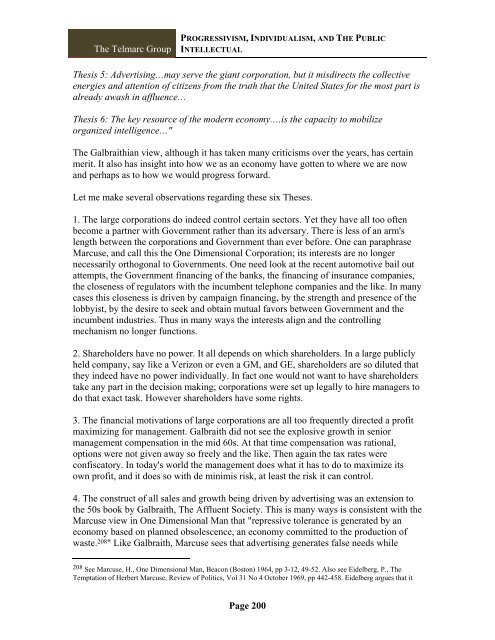progressivism, individualism, and the public ... - Telmarc Group
progressivism, individualism, and the public ... - Telmarc Group
progressivism, individualism, and the public ... - Telmarc Group
You also want an ePaper? Increase the reach of your titles
YUMPU automatically turns print PDFs into web optimized ePapers that Google loves.
The <strong>Telmarc</strong> <strong>Group</strong><br />
PROGRESSIVISM, INDIVIDUALISM, AND THE PUBLIC<br />
INTELLECTUAL<br />
Thesis 5: Advertising…may serve <strong>the</strong> giant corporation, but it misdirects <strong>the</strong> collective<br />
energies <strong>and</strong> attention of citizens from <strong>the</strong> truth that <strong>the</strong> United States for <strong>the</strong> most part is<br />
already awash in affluence…<br />
Thesis 6: The key resource of <strong>the</strong> modern economy….is <strong>the</strong> capacity to mobilize<br />
organized intelligence…"<br />
The Galbraithian view, although it has taken many criticisms over <strong>the</strong> years, has certain<br />
merit. It also has insight into how we as an economy have gotten to where we are now<br />
<strong>and</strong> perhaps as to how we would progress forward.<br />
Let me make several observations regarding <strong>the</strong>se six Theses.<br />
1. The large corporations do indeed control certain sectors. Yet <strong>the</strong>y have all too often<br />
become a partner with Government ra<strong>the</strong>r than its adversary. There is less of an arm's<br />
length between <strong>the</strong> corporations <strong>and</strong> Government than ever before. One can paraphrase<br />
Marcuse, <strong>and</strong> call this <strong>the</strong> One Dimensional Corporation; its interests are no longer<br />
necessarily orthogonal to Governments. One need look at <strong>the</strong> recent automotive bail out<br />
attempts, <strong>the</strong> Government financing of <strong>the</strong> banks, <strong>the</strong> financing of insurance companies,<br />
<strong>the</strong> closeness of regulators with <strong>the</strong> incumbent telephone companies <strong>and</strong> <strong>the</strong> like. In many<br />
cases this closeness is driven by campaign financing, by <strong>the</strong> strength <strong>and</strong> presence of <strong>the</strong><br />
lobbyist, by <strong>the</strong> desire to seek <strong>and</strong> obtain mutual favors between Government <strong>and</strong> <strong>the</strong><br />
incumbent industries. Thus in many ways <strong>the</strong> interests align <strong>and</strong> <strong>the</strong> controlling<br />
mechanism no longer functions.<br />
2. Shareholders have no power. It all depends on which shareholders. In a large <strong>public</strong>ly<br />
held company, say like a Verizon or even a GM, <strong>and</strong> GE, shareholders are so diluted that<br />
<strong>the</strong>y indeed have no power individually. In fact one would not want to have shareholders<br />
take any part in <strong>the</strong> decision making; corporations were set up legally to hire managers to<br />
do that exact task. However shareholders have some rights.<br />
3. The financial motivations of large corporations are all too frequently directed a profit<br />
maximizing for management. Galbraith did not see <strong>the</strong> explosive growth in senior<br />
management compensation in <strong>the</strong> mid 60s. At that time compensation was rational,<br />
options were not given away so freely <strong>and</strong> <strong>the</strong> like. Then again <strong>the</strong> tax rates were<br />
confiscatory. In today's world <strong>the</strong> management does what it has to do to maximize its<br />
own profit, <strong>and</strong> it does so with de minimis risk, at least <strong>the</strong> risk it can control.<br />
4. The construct of all sales <strong>and</strong> growth being driven by advertising was an extension to<br />
<strong>the</strong> 50s book by Galbraith, The Affluent Society. This is many ways is consistent with <strong>the</strong><br />
Marcuse view in One Dimensional Man that "repressive tolerance is generated by an<br />
economy based on planned obsolescence, an economy committed to <strong>the</strong> production of<br />
waste. 208 " Like Galbraith, Marcuse sees that advertising generates false needs while<br />
208 See Marcuse, H., One Dimensional Man, Beacon (Boston) 1964, pp 3-12, 49-52. Also see Eidelberg, P., The<br />
Temptation of Herbert Marcuse, Review of Politics, Vol 31 No 4 October 1969, pp 442-458. Eidelberg argues that it<br />
Page 200












